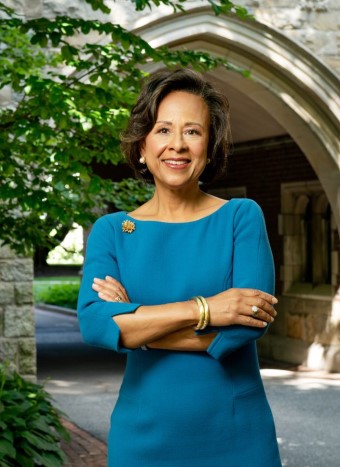
If you set out to chart the impact of Wellesley in the world, you’d be hard-pressed to find a better exemplar than Elizabeth “Liz” Miranda ’02, a Massachusetts state lawmaker and this year’s commencement speaker.
The daughter of Cabo Verdean immigrants, Rep. Miranda grew up in Roxbury, Mass.—part of the same culturally diverse community she now serves as state representative in the 5th Suffolk District. She came to Wellesley at age 17, “really rough around the edges,” as she recalls, but ready to grow and learn. “I came to Wellesley not sure what was possible,” she said in a StoryCorps interview. “I left knowing nothing was impossible.”
Before her election to the Massachusetts Legislature, Rep. Miranda worked as a nonprofit administrator, community builder, and organizer, always with the goal of community empowerment, violence prevention, and social justice. From the start, she was fiercely committed to opening doors for those who came behind her. “How do I go back home and create a new narrative for girls who look like me?” This is a question she grappled with during her college years.
This story goes far to explain why inclusive excellence holds such a prominent place among Wellesley’s core values. Diversity is not simply a matter of equity and fairness, though it’s certainly that, as well. It’s also essential to addressing the world’s most urgent problems. Simply put, you can’t have excellence without diversity of life experience.
This reality shone through in a terrific alumnae panel on how to confront racism in policing, featuring civil rights lawyers Julia Yoo ’92 and Kisha A. Brown ’00, who have both been out front on this catalyzing issue. The panel was moderated by Dean of Academic Affairs Michael Jeffries, Class of 1949 Professor in Ethics and professor of American studies, a brilliant scholar of race, class, and gender who is deeply committed to social justice at and beyond Wellesley.
Over the past year, the nation—and the world—was galvanized by the murder of George Floyd and the trial and subsequent conviction of his killer, Derek Chauvin. Still, we are a long way from where we need to be, and—as the panelists agreed—every one of us has an essential role to play. “We need to build alliances with people who are not the usual suspects,” said Yoo, who serves as president of the National Police Accountability Project. “When a white soccer mom calls a legislator and says, ‘Policing is a priority for me, racial equity is a priority for me,’ that can be a game changer.”
In sum, effective social change requires a big tent. Here, as everywhere, excellence reflects inclusion.
Back on campus, Wellesley’s environmental sustainability efforts offer another excellent case in point. An innovative class created by Norma Wilentz Hess Professor of Economics Casey G. Rothschild brought together a group of students to come up with actions students might take to defray the costs of ceasing to invest in fossil fuels in the future. They did so through a combination of economic analysis, student consultation, and campus advocacy.






